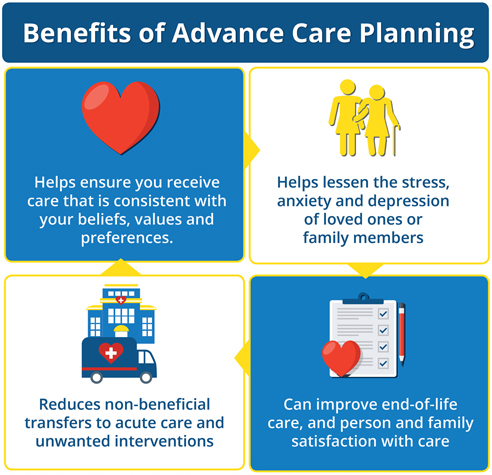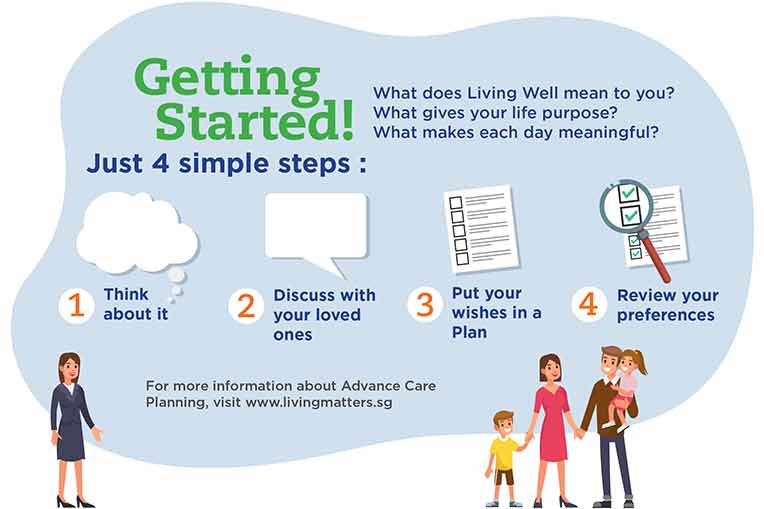Planning Ahead for your Healthcare Journey: Why Advance Care Planning Matters for You and Your Loved Ones
Understanding Advance Care Planning
Advance Care Planning (ACP) is a national programme that aims to empower Singaporeans to choose how they would like to be cared for. ACP is a process that involves making decisions about future healthcare preferences and documenting them in advance. It goes beyond simply discussing end-of-life care and encompasses a range of healthcare decisions that individuals may face as they age. ACP typically involves conversations with healthcare providers, family members, and trusted individuals to ensure that the individual's wishes are known and respected. In the event that the individual is no longer able to make decisions or speak for themselves, the ACP guides the decision makers to act in their best interest. Below is a short video on what is ACP.
Why Advance Care Planning Matters
As individuals age, their healthcare needs often become more
complex. They may face chronic illnesses, degenerative conditions, or a decline
in cognitive abilities. Engaging in advance care planning is essential for the
elderly population due to several reasons:
Ensuring Personalized and Patient-Centered Care: ACP allows
individuals to express their healthcare preferences, values, and goals. It
helps healthcare providers understand their unique needs and tailor medical
treatments accordingly, ensuring that care is aligned with their wishes.
Reducing the Burden on Family Members: ACP relieves the
burden on family members who would otherwise have to make challenging
healthcare decisions on behalf of their loved ones. By clearly communicating
their preferences in advance, individuals empower their families to honor their
choices and reduce the potential for conflict or guilt among family members.
Benefits of Advance Care Planning
a. Control over Medical Treatment
One of the primary benefits of ACP is that it grants
individuals control over their medical treatment. By engaging in advance care
planning, the elderly can express their preferences regarding resuscitation,
life support, and other medical interventions. They can also outline their
desires for palliative care or end-of-life comfort measures, ensuring that
their healthcare journey aligns with their values.
b. Relieving Family Burden
ACP helps alleviate emotional distress and guilt for family
members who may otherwise be burdened with making difficult healthcare
decisions. By clearly expressing their wishes, the elderly provide clarity and
guidance to their loved ones, easing the emotional burden associated with
decision-making during challenging times.
c. Enhancing End-of-Life Care
Advance care planning facilitates access to appropriate pain
management, symptom control, and palliative care for the elderly. By clearly
articulating their preferences, individuals can ensure that their end-of-life
care is focused on maintaining comfort, dignity, and quality of life. This can
provide peace of mind for both the individual and their family members.
When to Start on Advance Care Planning
It is important to start planning for advance care early,
even before any health issues arise. While it may seem daunting to contemplate
end-of-life decisions, engaging in advance care planning sooner rather than
later allows for more thoughtful and comprehensive decision-making. Ideally,
discussions about advance care planning should begin when individuals are in
good health and able to express their wishes clearly. By starting the process
early, you can have more time to engage in meaningful conversations, explore
your options, and document your healthcare preferences.
The Process of Advance Care Planning
The process of advance care planning involves open and
honest communication with healthcare providers, family members, and trusted
individuals. It is essential to have these conversations while the elderly
person is still capable of expressing their preferences. Documentation of
healthcare preferences through advance directives, living wills, or appointing
a healthcare proxy is a critical part of the process. These legal documents
serve as a guide for healthcare providers and family members when making
decisions on behalf of the individual.
The types of questions that are we need to think about and ask include the following:
Health and Treatment Preferences
- What are your healthcare goals and priorities?
- Are there specific medical treatments or interventions that you would want or not want?
- How do you feel about life-sustaining treatments such as CPR, mechanical ventilation, or feeding tubes?
- What are your thoughts on pain management and palliative care?
- Do you have any cultural or religious considerations that may influence your healthcare decisions?
Quality of Life Considerations
- What does a good quality of life mean to you?
- Are there activities or relationships that hold special importance to you?
- How do you envision your daily life and routines in the context of your healthcare?
End-of-Life Care Preferences
- What are your thoughts on hospice care and receiving care in a palliative care facility or at home?
- Do you have any preferences regarding the location of your end-of-life care?
- Are there specific spiritual or emotional needs you would like addressed during end-of-life care?
- Do you have any specific requests for funeral or memorial arrangements?
Decision-Making Preferences
- Whom do you trust to make healthcare decisions on your behalf if you are unable to do so?
- Would you like to appoint a healthcare proxy or establish a durable power of attorney for healthcare?
- Are there specific instructions or guidelines you would like your healthcare proxy to follow?
Reviewing and Updating
- How frequently would you like to review and update your advance care planning documents?
- What circumstances or events should prompt a reassessment of your healthcare preferences?
- Are there any changes in your health or personal circumstances that may warrant a revision of your advance care planning?
Resources and Support for Advance Care Planning
Various resources and support systems are available to
assist individuals and families in engaging in advance care planning.
Healthcare professionals, such as doctors, nurses, and social workers, can
provide guidance and facilitate conversations about healthcare preferences.
Community organizations and legal experts may also offer educational materials,
advance care planning guides, and legal forms specific to the jurisdiction.
Advance Care Planning (ACP) may be done at most hospitals,
selected polyclinics, and community care providers:
- If you are a patient at a hospital or polyclinic, please ask your doctor for a referral.
- If you are generally in good health, you may make an appointment at ACP providers listed at Agency of Integrated Care (AIC) website.
Conclusion
Advance care planning is a vital process that empowers not just the elderly to make informed healthcare decisions and ensures their preferences are
respected. By engaging in advance care planning, whether old or young, we can maintain
control over their medical treatment, alleviate the burden on their loved ones,
and enhance the quality of their end-of-life care. It is never too early to
start these conversations and document healthcare preferences. Let us embrace
the power of advance care planning and promote a culture of compassionate and
person-centered care for our aging population.
👆😀



Comments
Post a Comment